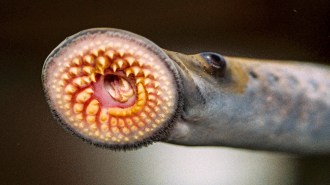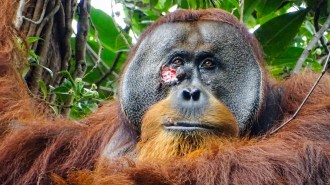All Stories
-
 Animals
AnimalsThis snake goes to extremes to play dead — and it appears to pay off
When dice snakes fake their death to avoid predators, those that use a combination of blood, poop and musk spend less time pretending to be dead.
-
 Neuroscience
NeuroscienceLampreys have ‘fight or flight’ cells, challenging ideas about nervous system evolution
The discovery of sympathetic nervous system cells in lampreys draws a closer tie between the animal and complex vertebrates — such as humans.
-
 Climate
ClimateAs the Arctic tundra warms, soil microbes likely will ramp up CO2 production
Experiments in mini greenhouses show how the tiny organisms lurking underground in a "sleepy biome" could be a contributor to climate change.
-
 Psychology
PsychologyOnline spaces may intensify teens’ uncertainty in social interactions
Little is known of how teens learn about emotions online and then use that knowledge to cope with social uncertainty during in-person encounters.
By Sujata Gupta -
 Animals
AnimalsWant to see butterflies in your backyard? Try doing less yardwork
Growing out patches of grass can lure adult butterflies and moths with nectar and offer lawn mower–free havens for toddler caterpillars.
By Susan Milius -
 Health & Medicine
Health & MedicineCollege students want to help during an opioid overdose but don’t know how
A survey of college students reported many are comfortable calling emergency services for an overdose, but fewer know how to intervene with naloxone.
-
 Animals
AnimalsThis orangutan used a medicinal plant on his face wound
Rakus the orangutan appeared to be treating a cut to his face with a plant that’s also used in traditional human medicine.
-
 Animals
AnimalsBelugas may communicate by warping a blob of forehead fat
Jiggling the “melon” like Jell-O seems to be associated with sexual behaviors, scientists say.
-
 Materials Science
Materials ScienceScientists developed a sheet of gold that’s just one atom thick
Ultrathin goldene sheets could reduce the amount of gold needed for electronics and certain chemical reactions.
By Skyler Ware -
 Health & Medicine
Health & Medicine50 years ago, margarine’s ‘healthy’ reputation began to melt away
In the 1970s, scientists began to suspect that margarine was bad for heart health. A key component, artificial trans fat, was a major factor.
-
 Space
SpaceScientists are getting closer to understanding the sun’s ‘campfire’ flares
The detection of cool plasma before the tiny outbursts on the sun is helping researchers make connections between campfire flares and other solar eruptions.
By Adam Mann -
 Environment
EnvironmentA new approach to fighting wildfires combines local knowledge and AI
Land managers in the western United States are using potential operational delineations, or PODS, to prepare for — and take advantage of — wildfires.
By Nikk Ogasa